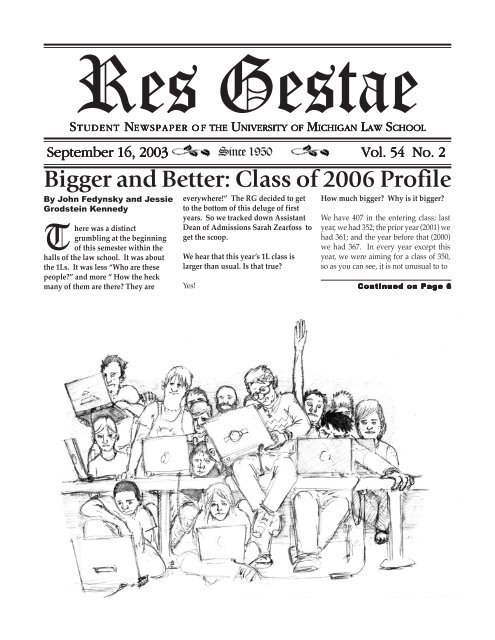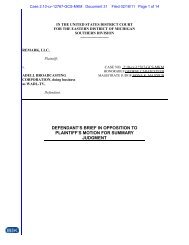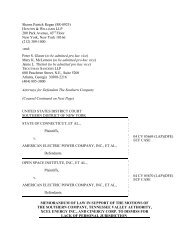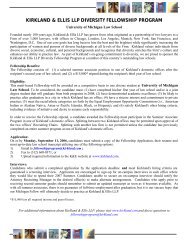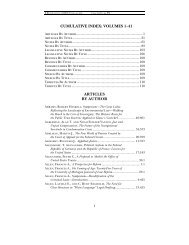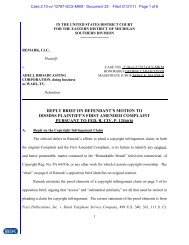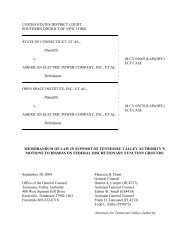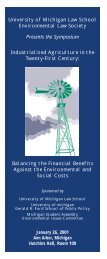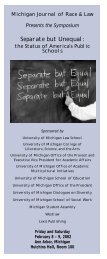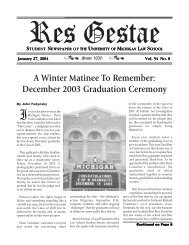Bigger and Better: Class of 2006 Profile - University of Michigan
Bigger and Better: Class of 2006 Profile - University of Michigan
Bigger and Better: Class of 2006 Profile - University of Michigan
Create successful ePaper yourself
Turn your PDF publications into a flip-book with our unique Google optimized e-Paper software.
Res Gestae • 16 September 2003<br />
Res Gestae<br />
N<br />
U<br />
STUDENT TUDENT NNEWSPAPER<br />
N EWSPAPER OF OF THE THE UUNIVERSITY<br />
U NIVERSITY OF OF MMICHIGAN<br />
M ICHIGAN LLAW<br />
L AW SSCHOOL<br />
S CHOOL<br />
September September 16, 16, 2003 2003 Since 1950<br />
Vol. Vol. 54 54 No. No. 2<br />
2<br />
<strong>Bigger</strong> <strong>and</strong> <strong>Better</strong>: <strong>Class</strong> <strong>of</strong> <strong>2006</strong> Pr<strong>of</strong>ile<br />
By John Fedynsky <strong>and</strong> Jessie<br />
Grodstein Kennedy<br />
There was a distinct<br />
grumbling at the beginning<br />
<strong>of</strong> this semester within the<br />
halls <strong>of</strong> the law school. It was about<br />
the 1Ls. It was less “Who are these<br />
people?” <strong>and</strong> more “ How the heck<br />
many <strong>of</strong> them are there? They are<br />
M<br />
everywhere!” The RG decided to get<br />
to the bottom <strong>of</strong> this deluge <strong>of</strong> first<br />
years. So we tracked down Assistant<br />
Dean <strong>of</strong> Admissions Sarah Zearfoss to<br />
get the scoop.<br />
We hear that this year’s 1L class is<br />
larger than usual. Is that true?<br />
Yes!<br />
L<br />
S<br />
1<br />
How much bigger? Why is it bigger?<br />
We have 407 in the entering class; last<br />
year, we had 352; the prior year (2001) we<br />
had 361; <strong>and</strong> the year before that (2000)<br />
we had 367. In every year except this<br />
year, we were aiming for a class <strong>of</strong> 350,<br />
so as you can see, it is not unusual to to<br />
Continued Continued Continued on on Page Page 6<br />
6
2<br />
Res Gestae<br />
Editor in Chief:<br />
Andy Daly<br />
Managing Editor:<br />
Jessie Grodstein Kennedy<br />
Executive Editor:<br />
John Fedynsky<br />
Contributing Editors:<br />
Andrew Cattell,<br />
Sharon Ceresnie,<br />
D.C. Lee,<br />
Sara Klettke MacWilliams,<br />
Michael Murphy,<br />
Matt Nolan<br />
Web Site Editor:<br />
Steve Boender<br />
Artist:<br />
Philip Weintraub<br />
Res Gestae is published biweekly during the<br />
school year by students <strong>of</strong> the <strong>University</strong> <strong>of</strong><br />
<strong>Michigan</strong> Law School. Opinions expressed in<br />
bylined articles are those <strong>of</strong> the authors <strong>and</strong> do<br />
not necessarily represent the opinions <strong>of</strong> the<br />
editorial staff. Articles may be reprinted without<br />
permission, provided that the author <strong>and</strong> Res<br />
Gestae are credited <strong>and</strong> notified.<br />
Res Gestae welcomes submissions. Please place<br />
all articles, columns, or opinion pieces in the<br />
Res Gestae pendaflex located on the third floor<br />
<strong>of</strong> Hutchins Hall across from the faculty<br />
mailroom. Submissions may be made on 3.5”<br />
disk or via email (preferably as an MS Word<br />
attachment). Res Gestae reserves the right to<br />
edit all submissions in the interest <strong>of</strong> space.<br />
Mailing address:<br />
Res Gestae<br />
<strong>University</strong> <strong>of</strong> <strong>Michigan</strong> Law School<br />
625 South State St.<br />
Ann Arbor, MI 48109<br />
Phone: (734) 936-2574<br />
Web Site Address:<br />
http://www.law.umich.edu/<br />
Journals<strong>and</strong>Orgs/rg/<br />
Office:<br />
116 Legal Research<br />
(near the Law School Student Senate <strong>of</strong>fice)<br />
rg@umich.edu<br />
Res Gestae • 16 September 2003<br />
By Andy Daly<br />
Greetings From the<br />
Editor’s Desk<br />
Welcome back everyone. For<br />
you 1Ls <strong>and</strong> other new<br />
faces, welcome to <strong>Michigan</strong>.<br />
I greet you with a newly found feeling<br />
<strong>of</strong> excitement <strong>and</strong> a rejuvenated spirit<br />
going into my second year as Editor-In-<br />
Chief <strong>of</strong> the Res Gestae. I know, I know -<br />
I am 3L, I am not supposed to be excited.<br />
I am supposed to be bored, blasé – just<br />
waiting for May so I can collect my diploma.<br />
Two events, however, have<br />
dragged me from the doldrums <strong>of</strong> the 3L<br />
trudge to enjoy my new lease on law<br />
school life.<br />
The first event was last week’s Student<br />
Organization Fair. I missed last year’s fair<br />
due to a callback.This year I dragged<br />
myself from my basement apartment to<br />
go introduce myself to people I didn’t<br />
know <strong>and</strong> was resenting the two hours<br />
that was being cut out <strong>of</strong> my “RapCity:<br />
The Bassment” watching time. Yet within<br />
minutes <strong>of</strong> being at the fair, I felt like a<br />
different person. The enthusiasm displayed<br />
by the new students, not just with<br />
respect to the two organizations I was<br />
representing, but to the idea <strong>of</strong> student<br />
participation in general was immediately<br />
energizing. Granted, the Res Gestae table<br />
was stocked with entirely too much<br />
c<strong>and</strong>y, but the buzz generated by students<br />
willing to participate was genuine, <strong>and</strong><br />
not simply a function <strong>of</strong> my inhalation <strong>of</strong><br />
confections.<br />
Fall 2003<br />
Publication Schedule:<br />
September 30<br />
October 14<br />
October 28<br />
November 11<br />
November 25<br />
The second event was the thrashing<br />
that the Wolverine football team h<strong>and</strong>ed<br />
down to Notre Dame this weekend. I will<br />
behave myself <strong>and</strong> control my Boston<br />
College-bred desire to rub the Golden<br />
Domers’ faces in their defeat; it suffices<br />
to say that watching that game has definitely<br />
knocked a little jade <strong>of</strong>f this 3L. I<br />
am almost inspired enough to clean my<br />
shower.<br />
Back to the student organization fair, I<br />
would like to thank everyone who came<br />
by the Res Gestae table <strong>and</strong> expressed<br />
interest in our publication. I would also<br />
like to make my annual plea to all students<br />
who wish to contribute, in any<br />
small way, to feel free to join us this year.<br />
To be honest, this is a much more interesting<br />
<strong>and</strong> vibrant publication when<br />
more students contribute their opinions<br />
<strong>and</strong> viewpoints. Also, in a continuing effort<br />
from last year, we are doing our best<br />
to cover the events <strong>and</strong> programming at<br />
the law school. To make it easier for students<br />
to participate in this coverage we<br />
will be maintaining a “docket” on our<br />
<strong>of</strong>fice door – Legal Research 116. If you<br />
plan to attend an event <strong>and</strong> would like to<br />
cover it – please check our board <strong>and</strong> sign<br />
up.<br />
Finally, we have some news <strong>of</strong> our own.<br />
Congratulations are in order for two <strong>of</strong><br />
our staff members on their August weddings.<br />
Our managing editor, Jessie<br />
Grodstein Kennedy, <strong>and</strong> contributing<br />
editor, Sara Klettke MacWilliams, celebrated<br />
their respective weddings this<br />
past August. I had the pleasure <strong>of</strong> attending<br />
<strong>and</strong> playing the trumpet at Sara’s<br />
wedding. As for the quality <strong>of</strong> my bugling,<br />
let’s just say, for a trumpet player, I<br />
make a pretty good law student.<br />
RG<br />
RG
Res Gestae • 16 September 2003<br />
Remembering 9/11: Then <strong>and</strong> Now<br />
To commemorate last week’s second anniversary <strong>of</strong> the September 11th attacks, Res Gestae has<br />
compiled a collection <strong>of</strong> past <strong>and</strong> present reflections. On this page, we have included the thoughts <strong>of</strong><br />
some current students as well as those <strong>of</strong> the students who were here in 2001. The quotes come from<br />
Vol. 52 No. 1, which was published on September 18, 2001.<br />
“For now, the enemy is faceless, <strong>and</strong> I<br />
can only st<strong>and</strong> up in the face <strong>of</strong> that anonymity<br />
<strong>and</strong> scream as loud as I can, ‘I’m<br />
AMERICAN! I’m free <strong>and</strong> I’ll st<strong>and</strong> up<br />
for my freedom!’”<br />
Hannah Mufson, ‘02 ‘Til Tuesday<br />
“But above all, I am sad for those individuals<br />
who do not have the goodness in<br />
their hearts to realize how precious life<br />
is, who do not recognize how lucky we<br />
all are to be connected in an invariable<br />
web <strong>of</strong> friend <strong>and</strong> family who love us,<br />
<strong>and</strong> who have unerestinated the overwhelming<br />
strength <strong>of</strong> the human spirit.”<br />
Lauren Gibbs, ‘04 Human Spirit<br />
“Simply put, against a zealot diametrically<br />
opposed to our very way <strong>of</strong> life,<br />
there is no compromise . . . . bin Laden<br />
<strong>and</strong> everyone who participates in his network<br />
<strong>of</strong> terror must die; every leader <strong>of</strong><br />
the Taliban must die; everyone who gave<br />
a dime to finance the operation must either<br />
die or languish on death row.”<br />
Yingtao Ho, ‘02 In the Wake <strong>of</strong> the News<br />
“The time is here for the civilized to<br />
embrace rage <strong>and</strong> retribution <strong>and</strong> let the<br />
uncivilized take their chances in a deadly<br />
game they all too deliberately began.”<br />
Anonymous, The Case for Rage <strong>and</strong> Retribution<br />
“As much as we trumpet that terrorism<br />
won’t force us to change our lifestyle,<br />
maybe some features <strong>of</strong> our lifestyle are<br />
worth reexamining, <strong>and</strong> ab<strong>and</strong>oning, if<br />
we want to look good in the world compared<br />
to the bin Ladens. At some point<br />
we may not have a choice but to change;<br />
maybe that point has come.”<br />
David Boyle, ‘02 Apocalypse When<br />
“The test is in how a nation channels a<br />
righteous anger. And in how a nation<br />
resolves deep-seated fears that were unearthed<br />
as we watched a symbol <strong>of</strong> our<br />
power crumble into powder <strong>and</strong> dust.”<br />
Harry Mihas, ‘02 Never the Same Again<br />
Jessie Grodstein Kennedy, 2L - worked at Environmental Protection Agency<br />
in 2001<br />
I was working in Crystal City, Virginia – just one stop beyond the Pentagon<br />
on the blue line. Impossibly, insufferably late, I never made it to the <strong>of</strong>fice by<br />
9:00. Today, however, I was in relatively early – 9:05. I walked into the bay area<br />
<strong>of</strong> the <strong>of</strong>fice where the TV, which normally served as a glorified paper weight,<br />
was actually turned on. In a voiceover, Matt Lauer was speaking to a man via<br />
the telephone – the interviewee, through a thick New York accent, insisting<br />
that there was an American Airlines detail on the plane. The plane that flew<br />
into the World Trade Center. I had recently read an article about the terrible<br />
navigating system at LaGuardia, how fortunate passengers were that there<br />
hadn’t been a cataclysmic crash in recent years. So finally it happened, I thought.<br />
My father, who extols the virtues <strong>of</strong> Newark Airport, was proved right.<br />
But then I saw the second plane hit. I raced to the phone <strong>and</strong> dialed my dad,<br />
my mom, my sister, my boyfriend – no answer. Nothing but that amazingly<br />
irritating series <strong>of</strong> notes that let me know that I was never, ever, going to get<br />
through. And as coworkers slowly trailed into the <strong>of</strong>fice, mesmerized by the<br />
scene on TV, there was another loud crash. And the building seemed to shake.<br />
The voiceover informed us that the Pentagon was struck. The cloud <strong>of</strong> smoke,<br />
which originated nearly a mile away, was visible through the window. I walked<br />
out <strong>of</strong> the <strong>of</strong>fice, my feet barely able to support my weight.<br />
I still shake just thinking about it.<br />
John Fedynsky, 3L - U <strong>of</strong> M 1L in 2001<br />
When the towers were hit, I was in Criminal Law with Pr<strong>of</strong>essor Susanna<br />
Blumenthal. I heard some rumblings in the Quad about the news <strong>and</strong> went back to<br />
my apartment, where I watched TV. Reports about the Pentagon flashed on the screen.<br />
I watched in dumbfounded awe as the second tower collapsed. Seeing that event<br />
live penetrated me more than any <strong>of</strong> the replays.<br />
I dragged myself to my 11:15 a.m. civil procedure course with visiting pr<strong>of</strong>essor<br />
Ana Merico-Stephens. Most <strong>of</strong> my section was there. Everyone knew what happened<br />
<strong>and</strong> was quietly beside themselves. Pr<strong>of</strong>. Merico-Stephens noted how emotional<br />
things were <strong>and</strong> deferred to us as to whether to hold class. Soon, Dean Lehman<br />
canceled all classes for the day. One student asked if anyone doubted the safety <strong>of</strong><br />
family <strong>and</strong> friends. Many did, so we decided not to have class.<br />
The next day, each pr<strong>of</strong>essor briefly mentioned “yesterday’s events.” All soldiered<br />
through the day, lecturing <strong>and</strong> refraining from cold-calling students. During civil<br />
procedure, there was an awkward moment when we heard military jets rumbling<br />
overhead <strong>and</strong> sirens wailing nearby. Televisions were stationed throughout the Law<br />
School. People seemed numb. On a personal note, I did not feel normal again until<br />
driving home a few days later to Detroit. I went by the airport <strong>and</strong> saw a long line <strong>of</strong><br />
jets approaching for safe l<strong>and</strong>ings.<br />
I could not help but smile.<br />
3
4<br />
By Jessie Grodstein<br />
Kennedy<br />
Res Gestae • 16 September 2003<br />
Speaker Offers New Insights on<br />
Middle East<br />
Contrary to the old adage, familiarized<br />
to most by some vener<br />
able sixth grade teacher, history<br />
doesn’t repeat itself all the time. For<br />
if it did, the political world would be far<br />
easier to navigate; human beings (even<br />
those elevated to political <strong>of</strong>fice) do have<br />
the capacity to learn from their mistakes.<br />
Rather, there are subtle differences that<br />
make the study <strong>of</strong> history – <strong>and</strong> its relation<br />
to modern events – challenging to<br />
predict. In his address to law students on<br />
September 10, Todd M. Endelman, Pr<strong>of</strong>essor<br />
<strong>of</strong> Modern Jewish History at the<br />
<strong>University</strong>, discussed some <strong>of</strong> those differences<br />
in his presentation “When Anti-<br />
Zionism Becomes Anti-Semitism.”<br />
According to Endelman, a key difference<br />
between Holocaust era anti-<br />
Semitism <strong>and</strong> modern anti-Semitism, relates<br />
to the current makeup <strong>of</strong> Western<br />
Europe. Absent the political <strong>and</strong> economic<br />
instability <strong>of</strong> the inter-World War<br />
period, modern Europe is a far different<br />
place than it was seventy years ago. While<br />
the Europe <strong>of</strong> the 1930’s featured an array<br />
<strong>of</strong> right-wing political parties who<br />
wished to undue the process <strong>of</strong> Jewish<br />
emancipation, modern European political<br />
parties are more pragmatic, <strong>and</strong>, according<br />
to Endelman, “less concerned<br />
with being tied to true-blue ideals.”<br />
One <strong>of</strong> the ways in which the political<br />
l<strong>and</strong>scape reflects this shift is in the fact<br />
that the left-wing parties, which had historically<br />
come to the defense <strong>of</strong> Jews (i.e.<br />
the Dreyfus Affair <strong>of</strong> 1890’s France), is<br />
now a source <strong>of</strong> criticism – particularly<br />
in the realm <strong>of</strong> current Israeli policies.<br />
This observation leads into Endelman’s<br />
key point, that modern anti-Zionism can,<br />
<strong>and</strong> does, easily cross the line into anti-<br />
Semitism.<br />
Zionism, which was popularized by<br />
Theodore Herzl in the late nineteenth century,<br />
is the movement advocating the return<br />
<strong>of</strong> Jews to Israel. Anti-Zionism,<br />
which Endelman defines to include the<br />
practice <strong>of</strong> questioning the legitimacy <strong>of</strong><br />
the state <strong>of</strong> Israel, crosses the line when it<br />
is turned into a morality play – when<br />
there are good guys on one side <strong>and</strong> bad<br />
guys on the other. Of course the bad guys<br />
in this script are always Israelis.<br />
What is interesting to note, however,<br />
is that this demonization <strong>of</strong> the other side<br />
exists in both camps – American Jews, for<br />
example, have been faulted for demonizing<br />
those who support the Palestinian<br />
cause. A student remarked on this point<br />
noting that Palestinians are forced to be<br />
quiet when faced with the criticism that<br />
singling out Israel as the bad guy crosses<br />
the line into anti-Semitism. “I’m sorry but,<br />
as a Palestinian, Israeli aggresion is all<br />
that I’m focused on,” he admitted.<br />
Perhaps this is the part <strong>of</strong> the problem.<br />
The truth that Israel engages in practices<br />
that are deplorable, just as do the Palestinians,<br />
is a fact <strong>of</strong> the Middle East conflict<br />
that is impossible to ignore. To point<br />
the finger at the other side, while lionizing<br />
one’s own cause, is disingenuous.<br />
Endelman recognized this point, <strong>and</strong><br />
presented an interesting theory as to why<br />
the modern anti-Semetic outbursts (such<br />
as the attacks on synagogues, cemeteries,<br />
<strong>and</strong> kosher food shops in France this past<br />
April) have recently flared up in Europe.<br />
Modern anti-Semitism is, in fact, related<br />
to the Holocaust. All <strong>of</strong> the criticisms that<br />
fell on Europe (particularly France <strong>and</strong><br />
Germany) as a nest <strong>of</strong> the worst <strong>and</strong> most<br />
horrific regime in the modern era – (the<br />
recognition that Nazism is the functional<br />
equivalent <strong>of</strong> evil) – is now being deflected<br />
onto Israel. “For centuries Jews<br />
<strong>and</strong> others berated Europe for not living<br />
up to its own Enlightenment ideals,”<br />
Endelman noted, “But if everyone is [capable<br />
<strong>of</strong> being] a miserable killer, then<br />
why should Europeans be singled out?”<br />
And this was perhaps the most interesting<br />
insight that Endelman contributed<br />
to the all-too mired ground <strong>of</strong> the Middle<br />
East. Several students were interested in<br />
Endelman’s presentation, which was<br />
sponsored by the Jewish Law Students<br />
Association. They pressed him on the<br />
problem <strong>of</strong> media coverage, colonialism,<br />
<strong>and</strong> his assertion that Israel has the right<br />
to be Jewish just as France has a right to<br />
be French. And the ensuing discussion,<br />
which lasted well past its 1:20 scheduled<br />
end, was reason enough for me to miss<br />
my 1:30 Trademark class. My apologies,<br />
Pr<strong>of</strong>essor Eisenberg.<br />
RG<br />
RG
Res Gestae • 16 September 2003<br />
My Life As a 1L: Beverly Hills 48109<br />
By Michael Murphy<br />
Like most 1Ls, I spent the first<br />
couple <strong>of</strong> weeks <strong>of</strong> classes for<br />
getting everyone’s name from<br />
orientation <strong>and</strong> looking in vain for the<br />
bathrooms on the first <strong>and</strong> second<br />
floors <strong>of</strong> Hutchins Hall.<br />
Now that I’m settled in, I cannot<br />
shake the feeling that I’m in some sort<br />
<strong>of</strong> Bizarro High School Sitcom World<br />
where all the students are 30-year-old<br />
actors playing teenagers. We’ve all<br />
heard this comparison before, <strong>and</strong> it’s<br />
not untrue; the lockers, dances, <strong>and</strong><br />
same class schedules do seem awfully<br />
familiar. I’ve noticed that the name <strong>of</strong><br />
the game, like in high school, is simple;<br />
try to be cool, <strong>and</strong> avoid embarrassment<br />
at all costs.<br />
Then <strong>and</strong> now, I suck at this game.<br />
Example: On the first day <strong>of</strong> classes<br />
here, I took the wrong book to Contracts.<br />
I had a few minutes, so I left my<br />
stuff, went downstairs, <strong>and</strong> as I came<br />
back with the right book, I realized: I<br />
didn’t remember which classroom I just<br />
left. I never bothered to look at the schedule,<br />
or even the room number as I walked<br />
in. I just followed people from my section.<br />
Now, it’s almost class time, <strong>and</strong> I’m<br />
st<strong>and</strong>ing in the hallway with my Contracts<br />
book, looking <strong>and</strong> feeling like a<br />
complete moron. The high-schoolness <strong>of</strong><br />
the situation was not lost on me – I really<br />
ought to have been stuffed into a locker<br />
or given an atomic wedgie at that instant<br />
to add proper insult to injury.<br />
But I’ve learned <strong>and</strong> grown in the years<br />
since Jeff Gadja used to step on me as I<br />
sat on the grass at recess. Over time, I’ve<br />
learned that you can get away with anything<br />
if you look like you know what<br />
you’re doing. I retraced my steps, casually<br />
looked in each door, then made a<br />
complete guess, striding in confidently…<br />
into the right classroom. (I have also<br />
learned over time that you can get somebody<br />
to stop stepping on you if, as they’re<br />
doing it, you grab their ankle <strong>and</strong> ruin<br />
their expensive white tennis shoes by<br />
dumping ketchup on them. If you’re out<br />
there, Jeff, you remember that, baby?<br />
Yeah!)<br />
There’s more. In Torts on Friday, as the<br />
lecture started, I blasted that stupid windows<br />
chime at serious Quiet Riot Arena<br />
Rock volume. Luckily, two other laptops<br />
quickly answered my call with chimes <strong>of</strong><br />
their own.<br />
NOTE: To turn that sucker <strong>of</strong>f, Go to<br />
the Control Panel, click on “Sounds <strong>and</strong><br />
Audio Devices,” then on the “Sounds”<br />
tab, <strong>and</strong> scroll down in the program<br />
events window. You’re looking for “Start<br />
windows” <strong>and</strong> “Exit Windows,” <strong>and</strong><br />
there should be a little speaker next to<br />
them. Click on those, <strong>and</strong> change the<br />
“Sounds” option underneath the window<br />
to “(none)” (it’s all the way at the top <strong>of</strong><br />
the pull-down menu). There! Now you<br />
can turn your computer on in class <strong>and</strong><br />
not hammer on the mute button. Your<br />
pr<strong>of</strong>essor will thank you for it.<br />
RG<br />
RG<br />
5<br />
Oh, yeah. Speaking <strong>of</strong> my pr<strong>of</strong>essors;<br />
I’m not sure what they think <strong>of</strong> me. See,<br />
nobody told me when I had my ID card<br />
picture taken that it was going to be<br />
used in the Facebook <strong>and</strong> the seating<br />
charts for all <strong>of</strong> my classes. So, the<br />
week before orientation, when I had<br />
it done, I figured it would be like my<br />
undergrad ID. You know, I’d whip it<br />
out when I went to work out, or get<br />
into a basketball game, or whatever. I<br />
thought “who’s ever going to see<br />
this?” So, on my ID card, I did “Le<br />
Tigre” from the movie “Zool<strong>and</strong>er.”<br />
It’s a s<strong>of</strong>ter look, for catalog shots. I<br />
know. While it’s really fun to show my<br />
ID to people now, in many ways I blew<br />
my chance at suave respectability here<br />
before I even registered for classes.<br />
Finally, in a continuation <strong>of</strong> my<br />
quest to do embarrassing/sc<strong>and</strong>alous<br />
things in public so as to derail (or ensure)<br />
a future career in politics, I somehow<br />
bonged a beer <strong>of</strong>f <strong>of</strong> a ro<strong>of</strong>top two<br />
weekends ago. I was on my way from<br />
tailgate party to tailgate party after the<br />
Houston game, <strong>and</strong> some undergrad kids<br />
challenged me. In public. What was I supposed<br />
to do? It was an experience so akin<br />
to the party scene in “Old School” it still<br />
troubles me. I saw those kids out there<br />
again before the Notre Dame game, <strong>and</strong><br />
they called me “Frank the Tank.” Little<br />
bastards.<br />
If my first two weeks here are any indication,<br />
I may as well just give up already<br />
on the idea <strong>of</strong> being ‘cool’ or ‘fly’<br />
or ‘hip’ <strong>and</strong> just do what I always do; be<br />
myself <strong>and</strong> don’t worry about it. If any<br />
<strong>of</strong> you other 1Ls are struggling with a recreation<br />
<strong>of</strong> social status in a new environment,<br />
you might want to try not bothering.<br />
If you were nerdy or something before,<br />
just be that way here. Keep it rolling.<br />
It’s easier <strong>and</strong> more fun, I think.
6<br />
CLASS, from Page 1<br />
enroll a class that is larger than the target:<br />
2000’s entering class was about 5%<br />
over, <strong>and</strong> 2001’s was about 3% over. This<br />
year, from the outset I was aiming for a<br />
slightly larger class <strong>of</strong> 380. The impetus<br />
for that was the state budget cutbacks;<br />
having more students in the entering class<br />
would mean less need for tuition increase.<br />
(That said, we certainly wouldn’t have<br />
increased the class if we couldn’t have<br />
done so comfortably <strong>and</strong> while maintaining<br />
the same very high level <strong>of</strong> talent in<br />
the student body. By objective measures,<br />
we certainly achieved the latter, since we<br />
have a higher LSAT/GPA combination<br />
than ever before.<br />
Did the size <strong>of</strong> the incoming class<br />
come as a surprise?<br />
In all events, 407 is more than 380 –<br />
about 7% more. So yes, it was a<br />
surprise! Our yield increased from 31%<br />
last year to 35% this year. Why did that<br />
happen? I wish I knew, so that I could<br />
know whether it was going to happen<br />
again next year. Some hypotheses: (1)<br />
a bad economy meant that fewer people<br />
ended up getting great jobs <strong>and</strong> so<br />
changing their mind about law school;<br />
(2) perhaps some people deposited<br />
conditionally, waiting to see what the<br />
outcome <strong>of</strong> the lawsuit would be, <strong>and</strong><br />
when we won, their conditions were<br />
Res Gestae • 16 September 2003<br />
<strong>Class</strong> <strong>of</strong> <strong>2006</strong> At A Glance<br />
Applied: 5440 Median <strong>of</strong> Those Enrolled<br />
Admitted: 1163 GPA: 3.60<br />
Enrolled: 407 LSAT: 167<br />
States Represented: 42<br />
<strong>Michigan</strong> Residents: 24% <strong>Class</strong> Composition:<br />
Non-<strong>Michigan</strong> Residents: 76% Male: 51%<br />
Foreign Countries Represented: 7 Female: 49%<br />
Undergraduate Institutions: 145 Minority: 30%<br />
Note: Some <strong>of</strong> the above data is subject to change. In particular, students can<br />
apply for residency until the third week <strong>of</strong> September. Dean Zearfoss estimates that<br />
the final percentage <strong>of</strong> Michgan residents will be 25 to 26 percent. There is also the<br />
possibility <strong>of</strong> last minute no-shows, altering the number <strong>of</strong> enrolled students.<br />
satisfied; <strong>and</strong> (3) rumor has it that one<br />
particular 1L is a fearsome recruiter<br />
who persuaded lots <strong>of</strong> people that<br />
<strong>Michigan</strong> was the best choice for law<br />
school..<br />
What issues/problems/implications<br />
does the size <strong>of</strong> the class raise for the<br />
Law School? The faculty? Upper-class<br />
students? The 1Ls themselves?<br />
I don’t think this will raise any particular<br />
problems for the law school; 27 more<br />
people means fewer than 7 people more<br />
per section, which simply translates to<br />
being called on slightly fewer times over<br />
the course <strong>of</strong> the semester! Seriously,<br />
Dean Baum told me in the summer that<br />
we could comfortably accommodate 306<br />
people in the fall class; we came in at 305.<br />
(For the record, the rumors that I “persuaded”<br />
a few last people to withdraw<br />
are simply rumors, <strong>and</strong> not provable in a<br />
court <strong>of</strong> law.) I like to think that the principal<br />
implication <strong>of</strong> all this is a very positive<br />
one – i.e., that <strong>Michigan</strong> is more<br />
popular than ever. It is far better to have<br />
a large <strong>and</strong> academically strong class than<br />
it is to be working the waiting list in late<br />
August, begging people to join you; several<br />
<strong>of</strong> our peer schools were in the latter<br />
position, <strong>and</strong> trust me, they weren’t<br />
happy about it.<br />
RG<br />
RG<br />
Getting Involved: Student Groups<br />
Welcome 1Ls at Student Organization Fair
By John Fedynsky<br />
We are moving to Room 100,”<br />
declared Dean Evan<br />
Caminker from the back <strong>of</strong><br />
the bursting room 250 Hutchins Hall. A<br />
large crowd <strong>of</strong> students, faculty <strong>and</strong><br />
guests had gathered on Monday, September<br />
8 th to hear H.E. Judge Bruno Simma<br />
<strong>of</strong> the International Court <strong>of</strong> Justice speak<br />
on the topic “The United States <strong>and</strong> International<br />
Adjudication: How Power<br />
Complicates Life.”<br />
A few minutes <strong>of</strong> commotion later,<br />
Caminker introduced Simma, who has<br />
taught regularly at the Law School since<br />
1986, to a nearly full Honigman Auditorium.<br />
Caminker recounted how Simma<br />
was qualified to speak on his topic because<br />
<strong>of</strong> his pr<strong>of</strong>essional, scholastic <strong>and</strong><br />
advocacy “bents.” Simma is a newly<br />
elected member <strong>of</strong> the International<br />
Court <strong>of</strong> Justice, has written extensively<br />
on international law, <strong>and</strong> has appeared<br />
repeatedly before the ICJ as an advocate,<br />
perhaps most notably for Germany in the<br />
famous LaGr<strong>and</strong> case.<br />
Simma argued that as America has become<br />
more powerful, its attitude towards<br />
international dispute resolution by third<br />
parties has become more cautious,<br />
guarded, <strong>and</strong>, at times, hostile. To support<br />
his conclusion, Simma <strong>of</strong>fered a historical<br />
account.<br />
Early on, states asserted their sovereignty<br />
jealously <strong>and</strong> resorted to war to<br />
settle disputes. The involvement <strong>of</strong> third<br />
parties like the Vatican was rare <strong>and</strong> usually<br />
ad hoc. According to Simma, there<br />
was basically no role for third parties in<br />
settling international disputes. Then<br />
America came onto the scene.<br />
Res Gestae • 16 September 2003<br />
Judge Bruno Simma<br />
Delivers Special Lecture<br />
Simma said that America pioneered the<br />
settlement <strong>of</strong> international disputes between<br />
states by an impartial third party<br />
in the Jay Treaty <strong>of</strong> 1794 with Great Britain.<br />
“The Jay Treaty gave birth to the<br />
modern method <strong>of</strong> international arbitration,”<br />
he said. In that treaty, three “commissions”<br />
dealt with 1) settling America’s<br />
northeast boundary with Canada 2) financial<br />
compensation for individuals’<br />
losses during the Revolutionary War <strong>and</strong><br />
3) financial compensation for individuals’<br />
losses during the pre-Napoleonic<br />
wars.<br />
Simma called the Jay Treaty’s arbitration<br />
provisions “a l<strong>and</strong>mark in the settlement<br />
<strong>of</strong> international disputes.” The reasons<br />
for America’s pioneering spirit were<br />
1) a desire to appear equal to Britain 2)<br />
the need for a cheap alternative to war<br />
<strong>and</strong> 3) federalism problems that required<br />
implementation <strong>of</strong> war settlement on the<br />
federal level under the treaty power.<br />
America’s progressive attitude continued<br />
through the 19 th Century. Simma<br />
cited the case <strong>of</strong> the Alabama, a confederate<br />
warship built in Britain. The Union<br />
objected to the ship but Britain failed to<br />
stop its delivery. Wartime damage caused<br />
by the Alabama – upwards <strong>of</strong> 70 ships captured<br />
or damaged – combined with other<br />
factors put America <strong>and</strong> Britain on the<br />
brink <strong>of</strong> war. Simma noted that “bells<br />
rang in Geneva” in 1872 when arbitration<br />
settled the dispute (Britain paid $50 million<br />
in gold) <strong>and</strong> prevented war.<br />
This attitude, though somewhat tempered,<br />
continued through the next decades<br />
as America pushed for permanent<br />
institutions for international arbitration,<br />
as well as for the concept <strong>of</strong> compulsory<br />
arbitration in which arbitration could pro-<br />
7<br />
ceed without the consent <strong>of</strong> one <strong>of</strong> the<br />
state parties.<br />
Presently, though, America is much less<br />
welcoming <strong>of</strong> third party international<br />
dispute settlement. Simma traced this<br />
shift to the International Court <strong>of</strong> Justice’s<br />
“shocking” exercise <strong>of</strong> jurisdiction in 1984<br />
over American activity in Nicaragua.<br />
Since then, America has limited its relationship<br />
with the ICJ by, for example,<br />
seeking to control the composition <strong>of</strong> judicial<br />
panels. Simma dubbed this phenomenon<br />
“participation with influence.”<br />
America has also made reservations to<br />
treaties with provisions granting compulsory<br />
jurisdiction to the ICJ.<br />
Elsewhere, the World Trade Organization<br />
is under the constant threat <strong>of</strong> American<br />
withdrawal from its dispute settlement<br />
mechanisms. Finally, Simma<br />
brought up the “sad note” <strong>of</strong> America’s<br />
“<strong>of</strong>fensive” opposition to the International<br />
Criminal Court. America refused<br />
to ratify the treaty creating the ICC, insisted<br />
through the U.N. Security Council<br />
that peacekeeping operations be extended<br />
with the condition <strong>of</strong> immunity<br />
from the ICC, <strong>and</strong> pursued bilateral treaties<br />
with ICC member states to exclude<br />
America from the ICC’s jurisdiction.<br />
But on a final, positive note, Simma<br />
mentioned that America continues to<br />
honor existing binding commitments to<br />
the ICJ <strong>and</strong> other third-party institutions<br />
for the settlement <strong>of</strong> international disputes.<br />
At the end <strong>of</strong> his historical account,<br />
Simma restated to rousing applause his<br />
conclusion as to how power has complicated<br />
life for America vis-à-vis international<br />
adjudication. This semester, Simma<br />
is teaching “Leading Cases in International<br />
Law.”<br />
RG RG<br />
RG
8<br />
By Matt Nolan<br />
Every football season at Michi<br />
gan begins the same<br />
way…almost. Sometime<br />
around July (or for some <strong>of</strong> us, February)<br />
anticipation begins for the upcoming season.<br />
We read an article or two about the<br />
team, get a sense <strong>of</strong> what the strengths<br />
<strong>and</strong> weaknesses are going to be, <strong>and</strong> set<br />
our expectations for the year.<br />
At <strong>Michigan</strong> those expectations are<br />
rarely less than championship caliber, but<br />
those <strong>of</strong> us who have been around for a<br />
few seasons are usually hesitant to get our<br />
hopes up too early. We have seen what<br />
<strong>Michigan</strong> teams with high expectations<br />
have done in the past. We remain apprehensive<br />
about where our team will finish.<br />
Waking up on Saturday morning for<br />
<strong>Michigan</strong>’s showdown with the Fighting<br />
Irish, fans could feel a difference in the<br />
air. After beating up on creampuffs Central<br />
<strong>Michigan</strong> <strong>and</strong> Houston by a combined<br />
score <strong>of</strong> 95-10, we knew we were<br />
in for a fight against the team that always<br />
finds a way to win.<br />
I walked out <strong>of</strong> my apartment onto<br />
State Street at noon <strong>and</strong> the first thing that<br />
caught my eye was a <strong>Michigan</strong> fan<br />
dressed in maize <strong>and</strong> blue camouflage<br />
suit, capped with a <strong>Michigan</strong> football<br />
helmet <strong>and</strong> flag in his h<strong>and</strong>. Walking toward<br />
the stadium I wondered, “is this the<br />
year? Is this really the year when we win<br />
the games we should, <strong>and</strong> also win the<br />
games we can?” I instantly told myself<br />
to stop thinking ahead, to focus on one<br />
game at a time, <strong>and</strong> to win this game before<br />
thinking <strong>of</strong> the next.<br />
As I turned right from State Street onto<br />
Hoover I saw more <strong>Michigan</strong> fans. Some<br />
wore headgear, some had perfectly styled<br />
hairdos. Some looked as if they were 102<br />
years old, others were pushing their 2 nd<br />
birthday. Despite all <strong>of</strong> the differences<br />
these fans had two things in common:<br />
first, they all donned maize <strong>and</strong>/or blue,<br />
Res Gestae • 16 September 2003<br />
Maybe It’s Really Different This Year<br />
<strong>and</strong> second, they all wanted a <strong>Michigan</strong><br />
victory.<br />
In 1999 <strong>Michigan</strong> fans watched the Tom<br />
Brady led Wolverines go up 27 – 7 at<br />
home against Illinois only to blow the<br />
lead (<strong>and</strong> the season’s national title<br />
hopes) to lose 35 – 29. In 2000 we saw the<br />
most potent <strong>of</strong>fense in the history <strong>of</strong><br />
<strong>Michigan</strong> Football (<strong>and</strong> what a history it<br />
is) lose three games by a total <strong>of</strong> seven<br />
points because <strong>of</strong> a horrific defense. In<br />
2002 a great <strong>Michigan</strong> team stalled repeatedly<br />
in the red zone while controlling the<br />
game against hated Ohio State <strong>and</strong> lost<br />
14 – 9.<br />
2002 also saw Notre Dame steal the<br />
<strong>Michigan</strong> game 25-23. This year’s game<br />
was going to be big.<br />
Tailgating is a big part <strong>of</strong> football Saturday,<br />
<strong>and</strong> at <strong>Michigan</strong>, lots <strong>of</strong> the<br />
tailgaters are alumni. To get a parking<br />
spot in the victors’ lot on football Saturdays<br />
alumni need both a) money <strong>and</strong> b)<br />
connections. Scott Steiner, <strong>of</strong> WWE (or<br />
WCW) wrestling fame, was the first personality<br />
I saw. Desmond Howard was the<br />
second. Except for these rare faces I recognized,<br />
one would never know that the<br />
majority <strong>of</strong> the tailgating was being<br />
propagated by a bunch <strong>of</strong> millionaires<br />
<strong>and</strong> executives. Walking through the lot,<br />
the only people I saw were <strong>Michigan</strong> fans,<br />
<strong>and</strong> <strong>Michigan</strong> fans only.<br />
This is the power <strong>of</strong> <strong>Michigan</strong> Football.<br />
Whether $30,000/year or $30,000,000/<br />
year, everyone wears the same “M” shirts<br />
<strong>and</strong> chants the same “Let’s go Blue!”<br />
cheer in the Big House. Six or Seven times<br />
per fall, 111,000 people come together to<br />
practice the religion that is Football Saturday<br />
in Ann Arbor.<br />
This Saturday held something extra,<br />
though. We were not gathering to witness<br />
the sacrifice <strong>of</strong> another mid-major opponent:<br />
we were playing Notre Dame, the<br />
school that along with <strong>Michigan</strong> holds the<br />
most storied tradition in all <strong>of</strong> college<br />
football. The school that wrecked our<br />
hopes early last season. This game would<br />
be the game that solidified our expectations<br />
for the season.<br />
As the <strong>Michigan</strong> team took the field to<br />
the sound <strong>of</strong> 111,726 fans (a new NCAA<br />
attendance record) cheering <strong>and</strong> screaming,<br />
the energy in the crowd could be felt,<br />
an energy that I had not felt since being<br />
at <strong>Michigan</strong>. The fans prayed that Big<br />
Blue was going to win this game, <strong>and</strong> we<br />
were going to help them do it.<br />
Almost instantly those dreams could<br />
have been quelled. When <strong>Michigan</strong><br />
fumbled on the first series <strong>and</strong> gave Notre<br />
Dame the ball on <strong>Michigan</strong>’s 38-yard line,<br />
we could have despaired <strong>and</strong> written the<br />
game <strong>of</strong>f to another big game choke-job<br />
by John Navarre <strong>and</strong> Chris Perry. Over<br />
the last two seasons both have been turnover-prone<br />
in important games, <strong>and</strong><br />
while they looked good against CMU <strong>and</strong><br />
Houston, <strong>Michigan</strong> faithful had every<br />
reason to believe this was their resurfacing<br />
as the tanking duo <strong>of</strong> old.<br />
But instead, the crowd got louder.<br />
This season felt different, <strong>and</strong> those<br />
111,726 fans hailing from California to<br />
New York, from Miami to Houghton, MI<br />
were not giving up on this team. Three<br />
<strong>Michigan</strong> defensive stops <strong>and</strong> one yard<br />
gained by Notre Dame later, we were justified.<br />
<strong>Michigan</strong> never looked back. Rather<br />
than becoming a one-dimensional <strong>of</strong>fense<br />
or giving up big plays on defense, every<br />
aspect <strong>of</strong> the team held strong as Lloyd<br />
Carr’s team rolled up a 38 – 0 victory, the<br />
largest victory in the series’ history, <strong>and</strong><br />
the first <strong>Michigan</strong> shutout <strong>of</strong> Notre Dame<br />
since 1902. John Navarre became<br />
<strong>Michigan</strong>’s all-time passing leader. Chris<br />
Perry put his name on the top <strong>of</strong> the<br />
Heisman ballot.<br />
Most importantly, <strong>Michigan</strong> showed<br />
that this season may really be different<br />
than the others, <strong>and</strong> for once brought the<br />
fans’ anticipation <strong>of</strong> greatness to fruition.
NOLAN, from Page 8<br />
As I walked out <strong>of</strong> the stadium through<br />
Alumni Plaza I looked down the street at<br />
a literal sea <strong>of</strong> maize <strong>and</strong> blue, all moving<br />
in unison back toward their real lives.<br />
Despite our return to our respective lives<br />
on Monday morning, though, for at least<br />
one weekend we can all revel together in<br />
one <strong>of</strong> the greatest moments in <strong>Michigan</strong><br />
football history, <strong>and</strong> feel comfortable<br />
thinking those l<strong>of</strong>ty thoughts we’ve<br />
wanted to think since February.<br />
By D.C. Lee<br />
RG<br />
RG<br />
Res Gestae • 16 September 2003<br />
Anti-Discrimination Policy Inhibits<br />
Student Choice<br />
In his first public announcement<br />
<strong>of</strong> the 2003-04 school year, Dean<br />
Caminker reminded the Law<br />
School community, in case you forgot,<br />
that the <strong>University</strong> <strong>of</strong> <strong>Michigan</strong> Law<br />
School is a welcoming <strong>and</strong> supportive<br />
place for all its students, regardless <strong>of</strong><br />
race, color, national origin, ancestry, religion,<br />
creed, age, sex, marital status, sexual<br />
orientation, h<strong>and</strong>icap, or Vietnam-era<br />
veteran status. Presumably, the Law<br />
School is also a welcoming <strong>and</strong> supportive<br />
place for all its non-students regardless<br />
<strong>of</strong> these enumerated characteristics,<br />
but it’s not clear the Law School is a welcoming<br />
<strong>and</strong> supportive place for all its<br />
legal recruiters.<br />
According to Dean Caminker’s announcement,<br />
the Office <strong>of</strong> Career Services<br />
is open only to employers who certify in<br />
writing that they do not discriminate on<br />
the basis <strong>of</strong> the above mentioned categories.<br />
The “don’t ask, don’t tell” rule regarding<br />
homosexual activity in the military<br />
would thus preclude military agencies<br />
from recruiting at the Law School. If<br />
the Law School had its way, military<br />
agencies would be excluded from recruiting<br />
through the Office <strong>of</strong> Career Services.<br />
Got an Opinion?<br />
Send it to us at rg@umich.edu<br />
Want to cover an event?<br />
Check the docket on our door at<br />
116 Legal Research <strong>and</strong> sign up!<br />
The <strong>University</strong>, however, has instructed<br />
the Law School that its resources must be<br />
made available to all public agencies, regardless<br />
<strong>of</strong> whether they discriminate<br />
according to sexual orientation.<br />
The purpose, then, <strong>of</strong> Dean Caminker’s<br />
announcement is to reiterate the faculty’s<br />
commitment to “inclusiveness” <strong>and</strong> to<br />
note that the “presence <strong>of</strong> military interviewers<br />
within the Law School should not<br />
be misunderstood to reflect a decision by<br />
the School to endorse the ‘don’t ask, don’t<br />
tell’ policy in particular, or discrimination<br />
in general.” In other words, the Law<br />
School promotes inclusiveness with a<br />
policy that’s excluding in nature. In other<br />
news, the Law School does not endorse<br />
discrimination unless the discrimination<br />
serves the greater good <strong>of</strong> diversity,<br />
there’s a compelling state interest, <strong>and</strong> the<br />
means used to achieve that greater good<br />
are narrowly tailored.<br />
Assume for a moment that the <strong>University</strong><br />
did not force the Law School to allow<br />
military recruiters on campus. The<br />
Law School’s policy creates a social loss.<br />
Military recruiters would not recruit on<br />
campus unless students expressed some<br />
interest to work for these agencies, but<br />
by not allowing these agencies to recruit<br />
9<br />
on campus, the Law School makes it more<br />
difficult for interested students to find<br />
jobs. Moreover, students with a moderate<br />
level <strong>of</strong> interest would no longer have<br />
the opportunity to explore these employers<br />
in greater detail (as compared to firms<br />
who send recruiters to the Law School).<br />
But the military’s policy is discriminatory<br />
in nature, Dean Caminker says.<br />
Yeah, it is. It’s a terrible, bigoted policy.<br />
So what? Granting an organization access<br />
to the labor marketplace does not<br />
necessarily signal a tacit endorsement <strong>of</strong><br />
that organization’s views. In fact, the Law<br />
School goes out <strong>of</strong> its way to let its students<br />
know where it st<strong>and</strong>s on the issues.<br />
And this is where the Law School’s involvement<br />
should end. Because students<br />
must deal with the consequences <strong>of</strong> their<br />
employment decisions, students are in<br />
the best position to make discriminating<br />
choices about legal employers. Thankfully,<br />
the <strong>University</strong> has made the debate<br />
about military recruitment moot, but it’s<br />
troubling to realize how freely the Law<br />
School is willing to usurp students’ decision-making<br />
ability <strong>and</strong> expertise.<br />
RG<br />
RG
10<br />
By John Fedynsky<br />
Res Gestae • 16 September 2003<br />
Michig<strong>and</strong>ers Unite:<br />
State Bar Has Much to Offer<br />
One drawback <strong>of</strong> being at a national<br />
school is forgetting to think locally. Most<br />
people here – students <strong>and</strong> faculty alike<br />
– focus their attention on l<strong>of</strong>ty federal law<br />
<strong>and</strong> on far-away places like Washington,<br />
D.C., New York City, Chicago <strong>and</strong> Los<br />
Angeles. Then there are the international<br />
law buffs, who are fine in their own right<br />
too. Many <strong>of</strong> us through the course <strong>of</strong> law<br />
school see little more than a few square<br />
miles <strong>of</strong> Ann Arbor, the I-94 corridor <strong>and</strong><br />
the airport, which is an altogether different,<br />
deprived constituency.<br />
But there is a significant minority <strong>of</strong> us<br />
who intend to remain in <strong>Michigan</strong> <strong>and</strong><br />
practice here. And we <strong>of</strong>ten get lost in the<br />
shuffle. Sure, the lower tuition is great,<br />
but how many experts in <strong>Michigan</strong> law<br />
are on the faculty? Other law schools in<br />
<strong>Michigan</strong> <strong>of</strong>fer courses on state <strong>and</strong> local<br />
law <strong>and</strong> on specialized topics such as<br />
<strong>Michigan</strong> no-fault insurance law. In particular,<br />
I would like to see a seminar or a<br />
course on the <strong>Michigan</strong> constitution. This<br />
institution is, after all, the home <strong>of</strong> Thomas<br />
Cooley, perhaps the greatest expositor<br />
<strong>of</strong> state constitutional theory ever. To<br />
the extent that the Law School intellectually<br />
is a shining mansion on a hill, I find<br />
it puzzling that we can so consistently neglect<br />
our own backyard, not to mention<br />
the legacy <strong>of</strong> Cooley.<br />
My point is not to tear down the international<br />
programs or the academic emphasis<br />
on federal law here. The game<br />
need not be zero-sum. At a university,<br />
different disciplines can coexist. The Law<br />
School should embody that same ideal.<br />
Limited resources – many <strong>of</strong> which come<br />
directly from the Legislature in Lansing<br />
– is no excuse for entirely neglecting an<br />
area <strong>of</strong> law that deserves some attention.<br />
And if the reason is snobbery – i.e. “we<br />
don’t want to be ‘regional’ like Wayne<br />
State Law School or any ‘other’ (cough)<br />
inferior (cough) law school in <strong>Michigan</strong><br />
– then that reason is a sad institutional<br />
commentary indeed. Being a top-notch<br />
national law school <strong>and</strong> a regional center<br />
for <strong>Michigan</strong> law are not mutually exclusive<br />
concepts. Beefing up one need not<br />
entail watering down the other.<br />
Admittedly, student organizations <strong>and</strong><br />
clinical law programs do a lot for the local<br />
legal community, but more can be<br />
done. Toward that end, allow me the following<br />
sales pitch. The State Bar <strong>of</strong> <strong>Michigan</strong><br />
has a Law Student Section. Every student<br />
at the Law School is eligible to join.<br />
Benefits include awareness <strong>of</strong> developments<br />
<strong>and</strong> issues in the pr<strong>of</strong>ession, networking<br />
opportunities, <strong>and</strong>, perhaps<br />
most interestingly, locking in a practice<br />
number.<br />
Every lawyer in <strong>Michigan</strong> gets a socalled<br />
P-number. Think <strong>of</strong> it as a lawyer’s<br />
pr<strong>of</strong>essional social security number. Since<br />
they are given chronologically <strong>and</strong> must<br />
appear on all documents filed with a<br />
court, opposing counsel can immediately<br />
have some idea <strong>of</strong> when you took the bar<br />
exam. Silly as it sounds, the lower your<br />
P-number, the more seriously you are<br />
taken pr<strong>of</strong>essionally. Registering with the<br />
section as a 1L or a 2L can significantly<br />
lower your future P-number. (Caveat:<br />
while a student, you actually get an Snumber,<br />
which is not guaranteed to be<br />
your P-number. But established practice<br />
is that students are all but assured <strong>of</strong><br />
keeping the same number.)<br />
Annual membership costs $15, which<br />
pays for, among other things, a subscription<br />
to the <strong>Michigan</strong> Bar Journal. Interested<br />
students can apply on-line at http:/<br />
/www.michbar.org/. Just click on the<br />
“Law Student” link. You can also contact<br />
me for a paper application.<br />
In addition, each law school in <strong>Michigan</strong><br />
has three voting members <strong>and</strong> one<br />
alternate member on the Law Student<br />
Section Governing Council. Currently, I<br />
am the Law School’s only representative.<br />
We are the <strong>of</strong>ficial representatives <strong>of</strong><br />
<strong>Michigan</strong>’s law students <strong>and</strong> act as liaisons<br />
to the many sections <strong>of</strong> the State Bar.<br />
Interested c<strong>and</strong>idates may arrange an interview<br />
with me. We are particularly in<br />
need <strong>of</strong> interested 1Ls or 2Ls.<br />
The Council, which meets every month<br />
on Saturday mornings, also exists to promote<br />
student activity in the State Bar <strong>and</strong><br />
to further pr<strong>of</strong>essional opportunities<br />
among law students. This Saturday, September<br />
20 th , we are presenting our fall<br />
event: a symposium on solo practice<br />
called “How to Make Money <strong>and</strong> Stay<br />
Out <strong>of</strong> Trouble.” It is an all-day event at<br />
Thomas M. Cooley Law School in Lansing<br />
featuring some impressive speakers<br />
<strong>and</strong> practitioners. Even if you are not interested<br />
in being a solo practitioner, the<br />
symposium is a great networking opportunity,<br />
particularly for meeting law students<br />
from other schools. Contact me for<br />
a program, a free ticket, <strong>and</strong> (space permitting)<br />
free transport.<br />
If you are not planning on staying in<br />
<strong>Michigan</strong> (thanks for still reading!), I recommend<br />
joining your state’s bar association<br />
if you know where you will be. If you<br />
are not sure but <strong>Michigan</strong> is a possibility,<br />
then joining the Section now is still a good<br />
investment. At this stage, it is never too<br />
early to get involved.<br />
Despite the message that many <strong>of</strong> our<br />
pr<strong>of</strong>essors <strong>and</strong> casebooks send, a whole<br />
lot <strong>of</strong> law is made <strong>and</strong> administered on<br />
the state level. There is plenty <strong>of</strong> opportunity<br />
right here at home. Think locally!<br />
RG<br />
RG
Res Gestae • 16 September 2003<br />
11
12<br />
Federalist<br />
Society<br />
Organizational<br />
Meeting<br />
Tues., Sept. 16<br />
12:20 P.M.<br />
150 HH<br />
FREE PIZZA!!!<br />
National<br />
Environmental<br />
Law Moot Court<br />
Competition<br />
Informational<br />
Meeting:<br />
Thurs., Sept. 18<br />
4:00 P.M.<br />
118 HH<br />
soderda@umich.edu<br />
Res Gestae • 16 September 2003<br />
Announcements<br />
Law & Econ.<br />
Workshop<br />
“M<strong>and</strong>ated<br />
Disclosure &<br />
Stock Returns:<br />
Evidence From<br />
The Over-the-<br />
Counter<br />
Market”<br />
Allen Ferrell,<br />
Harvard<br />
Thurs., Sept. 18<br />
3:40-5:15 P.M.,<br />
238 HH<br />
Send Your Student<br />
Organization<br />
Announcements<br />
to rg@umich.edu<br />
Environmental<br />
Law Society<br />
First Fall<br />
Meeting<br />
Wed., Sept. 17th<br />
12:15 P.M.<br />
138 HH<br />
FREE PIZZA!!!<br />
Externship Info<br />
Meeting<br />
Friday<br />
Sept. 19<br />
12:30 P.M.<br />
218 HH<br />
Criminal Law<br />
Society<br />
General Meeting<br />
Wed., Sept. 17<br />
12:15 P.M.<br />
132 HH


